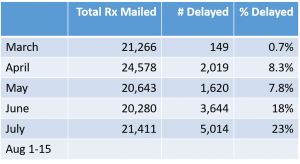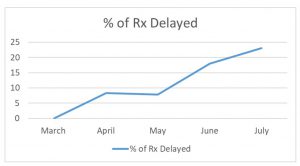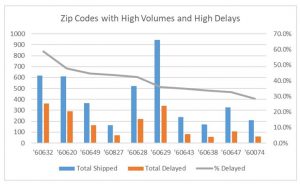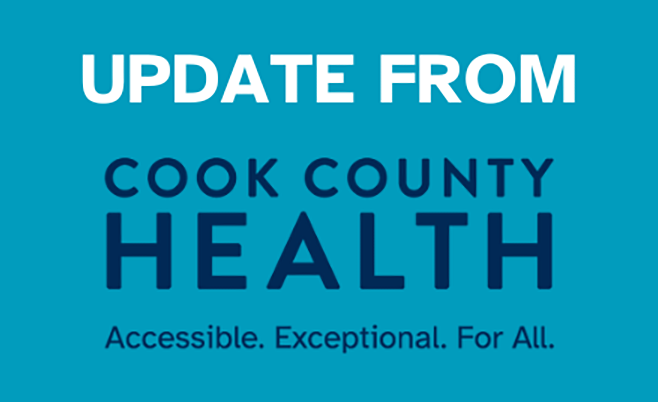Cook County Board President Toni Preckwinkle, U.S. Senator Dick Durbin, U.S. Congressmen Bobby Rush and Sean Casten, and Cook County Commissioner Dennis Deer Discuss the Impact U.S. Postal Service Delays Have on At-Risk Communities
Cook County Board President Toni Preckwinkle, U.S. Senator Dick Durbin, U.S. Congressmen Bobby Rush and Sean Casten, and Cook County Board Commissioner Dennis Deer joined Cook County Health leaders, doctors, pharmacists, and patients to discuss how the U.S. Postal Service’s cost-cutting measures have impacted the delivery of medications to Cook County Health patients.
New data from the mail-order pharmacy at Cook County Health indicates 23% percent of mail-order prescriptions were delayed in July 2020 compared to less than 1% of all Cook County Health mail-order medications in March 2020.


“We have some zip codes where 50% of our mail order prescriptions were delayed in July 2020,” said Dr. Claudia Fegan, Chief Medical Officer at Cook County Health. “In many cases, these are life-saving medications that treat diabetes, hypertension and other chronic illnesses. Without these medications, patients are at risk for complications that could lead to emergency room visits and hospitalizations at a time when we are asking people to stay home.”

Cook County Health’s mail order pharmacy fills more than 20,000 prescriptions every month and relies on the U.S. Postal Service to deliver prescriptions to patients.
The U.S Postal Service has made cost-cutting measures such as reducing overtime and curbing late delivery, which has created significant delays in mail deliveries across the nation.
“Over the past few weeks, there have been many troubling reports of operational changes within the United States Postal Service. Nearly 90% of seniors take a prescription drug, and one in six of them rely on the USPS for their medications. Eighty percent of veterans get their VA prescriptions delivered by mail,” said Senator Dick Durbin. “It is unacceptable for these folks to be worried about not receiving their mail with their life-saving medications. Senate Majority Leader Mitch McConnell must bring the Senate back in session to pass the House-passed Delivering for America Act for our seniors and veterans.”
“This has severely impacted seniors and other individuals who are at high-risk of exposure to COVID-19, who depend on the U.S. Postal Service to deliver their mail-order prescriptions on time,” said Cook County Board President Toni Preckwinkle.
Many patients at Cook County Health choose mail-order prescriptions for the convenience. There is no need to worry about transportation, getting to the pharmacy and concerns over the risk of higher exposure to COVID-19 in order to get their daily medications.
Patients have long been able to depend on the U.S. Postal Service to deliver their necessary medications on time to their front door. However, as the U.S. Postal Service delays mount, more and more patients at Cook County Health are seeing longer wait times to receive critical medications and our doctors, pharmacists, nurses and staff are concerned because the problem has been growing.
“Cook County Health patients have been able to rely on our pharmacy and the USPS for many years,” said Dr. Fegan. “This is yet another example of the impact of federal policy changes on vulnerable, at-risk communities.”
“Our patients deserve high-quality care AND continuity of care,” said Dr. Fegan. “They deserve to be able to receive their daily medications and not have to worry about how they will get to the pharmacy during the pandemic to pick up the prescriptions they need.”
Cook County Health patient Patricia Moore joined the press conference to share her personal experience with the delay in delivery of her high blood pressure medication.
“Having my medications delivered to me at home is very convenient. They always come on time and right to my home,” said Patricia Moore. “Recently, I did not receive my daily blood pressure medication order through the mail. I even went to the post office where I stood in line for over an hour and a half. There was not enough staff to check and see if my medication was there.”
Moore was able to receive an emergency order of her medication from Cook County Health until her mail order was delivered but had to leave her home and travel to Provident Hospital’s pharmacy.
“I am here today, masked and in public to say that there are more people like me who need their medications delivered on time and at their homes so we can be safe during COVID-19,” said Moore.
According to Dr. Fegan. “I worry about what could happen to my patients like Mrs. Moore if they are not able to take their medications regularly and on time.”
Halting antihypertensive medication for high blood pressure will allow blood pressure to rise again and put patients at risk for stroke and other complications of hypertension. High blood pressure is the most important preventable risk factor for stroke according to the American Heart Association and the American Stroke Association.
Mrs. Moore’s medications were one of many across the U.S. impacted by the U.S. Postal Service delays.
Cook County Health doctors, nurses, physician assistants and pharmacy staff have helped numerous patients dealing with the delay of their mail order medications.
“This is not about politics or partisanship. This is about people and their lives,” said President Preckwinkle. “We are here because we are worried about the health and safety of the residents of Cook County. There are hundreds of thousands of seniors and patients with disabilities and complex conditions in at-risk communities affected by the Trump administration’s failure to live up to its duty. We are proud to stand with them as we stand up to protect this essential service.”
CONTACT:
Deb Song, Director of Public Affairs
[email protected]
312-771-5041

